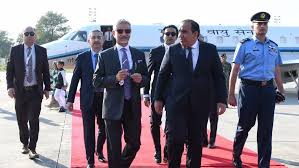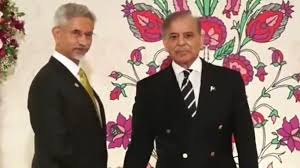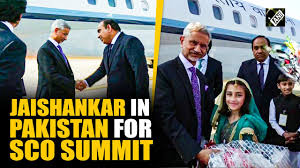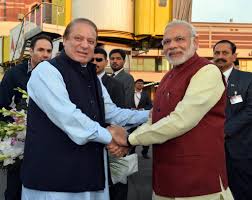At a Crossroads: Jaishankar’s SCO Visit and the India-Pakistan Impasse

Pakistan-India relations are currently in a uneasy state of no peace-no war. Bilateral engagement is virtually frozen, occasionally shaken by multilateral gatherings such as the ongoing Shanghai Cooperation Organization (SCO) summit where rhetorical duels between Pakistani and Indian representatives often make headlines.
As the SCO Council of the Heads of Government annual meeting gets underway with Pakistan as host, India’s announcement that its External Affairs Minister, S. Jaishankar, will represent Prime Minister Narendra Modi in Islamabad has raised eyebrows. However, it is unlikely that this visit will open the door to any potential diplomatic re-engagement between the two countries. The status quo is likely to prevail as the underlying strategic imperatives currently shaping the relationship have not changed. Furthermore, both sides have adapted to the new era of no engagement, and this template is likely to sustain in the medium term.

Three high-profile diplomatic visits from this bilateral’s recent history serve as an indicator of what to expect from Jaishankar’s visit and its potential to influence India-Pakistan engagement. The first is the visit of Indian Prime Minister Rajiv Gandhi to attend the 4th Summit of the South Asian Association for Regional Cooperation held in Islamabad in December 1988. It was the first visit by an Indian prime minister to Pakistan in nearly 28 years. This visit proved to be a watershed event, as both sides signed the Nuclear Non-Attack Agreement. It stabilized the bilateral relationship, and nearly six months later, Prime Minister Gandhi visited Islamabad again to meet with Prime Minister Benazir Bhutto, generating momentum in bilateral ties. However, this thaw in the relationship was short-lived, as messy domestic politics in both countries consumed the leaders’ attention, and both leaders lost power soon after.
It is unlikely that this visit will open the door to any potential diplomatic re-engagement between the two countries. The status quo is likely to prevail as the underlying strategic imperatives currently shaping the relationship have not changed.
The second visit that offers lessons is the one the late Sushma Swaraj, then Indian External Affairs Minister, undertook to Pakistan in December 2015. She travelled to Islamabad to represent India at the annual Heart of Asia-Istanbul Process conference on Afghanistan. Her delegation’s meeting with Prime Minister Nawaz Sharif led to a short-lived rapprochement, culminating in a surprise visit by Prime Minister Narendra Modi to Lahore a fortnight later. However, days after this visit, a militant attack in Pathankot undermined all the progress made between the leadership of the two countries.

The third visit to consider is that of Bilawal Bhutto-Zardari, then Pakistani Foreign Minister, to Goa in May 2023 to attend the SCO’s Council of Foreign Ministers meeting. It was the first visit to India by a Pakistani Foreign Minister in over a decade. Prior to that visit, both Pakistan’s Foreign Office and Bhutto-Zardari asserted that the visit’s focus was solely on the SCO agenda and that bilateral matters would not be raised. During the visit, the Pakistani foreign minister held delegation-level talks with other member countries, but not with the host country, India.
Now, Jaishankar is visiting Pakistan, the first high-level Indian official to do so in almost a decade. And similar to Bhutto-Zardari, he has already de-linked India-Pakistan issues from the SCO agenda, stating that India would be attending the meeting only as a “good member of the SCO.” And that no bilateral talks would be on the horizon. Later, Pakistan’s Foreign Minister Ishaq Dar also affirmed that while Pakistan will welcome Jaishankar as a “good host,” neither side has sought a bilateral meeting.

This adaptability to minimal engagement reflects a new normal in the India-Pakistan relationship, where both sides participate in multilateral fora and exchange perspectives but maintain almost zero bilateral contact. The underlying strategic dynamics guiding the relationship are such that neither side will make any effort to offer significant concessions. Both sides have adjusted to this new equilibrium. Jaishankar recently underlined that the era of “uninterrupted dialogue” with Pakistan is over. For both sides, that era has been over since at least 2019.
The events of August 2019 marked a significant turning point in the relationship. India’s abrogation of Article 370 from Jammu & Kashmir, which removed the special status granted to the UN-recognized disputed region, was seen in Pakistan as akin to unilaterally dissolving the dispute. New Delhi went further, with several statements from Indian defense, home, and external affairs ministers about taking “physical jurisdiction” of Pakistan-administered Kashmir only adding to hostilities between two countries.
Since then, hawkish nationalism has guided both sides’ outlook on the bilateral relationship. Despite changes in government in Pakistan – the opposition of 2019 is in office now, and the party that was in power then is in opposition at present – its India’s policy has remained unchanged. In early 2021, a backchannel explored ways to break the deadlock in ties and make progress. In fact, the highest-level call for engagement with India was made by former Pakistan army chief General Qamar Bajwa. However, the only outcome of the backchannel was a reaffirmation of the 2003 Ceasefire Understanding on the Line of Control (LoC). Beyond that, no substantive headway was made. Three years later, the status quo continues, which does not hurt either side.
For now, both sides have limited incentives and no compulsion to engage in substantial bilateral dialogue. Military tensions are down, but rhetorical duels continue.

The dilemma currently governing the strained ties remains: how to break the deadlock and resume dialogue? For India, talks and terrorism cannot go together. However, when India needs a ceasefire on the LoC, it engages in backchannel parleys with Pakistan, so it does not really seem like a precondition. For Pakistan, talks are conditioned on the reversal of Indian actions in Kashmir in August 2019 or at least restoring J&K’s statehood, but both seem unlikely.
For now, both sides have limited incentives and no compulsion to engage in substantial bilateral dialogue. Military tensions are down, but rhetorical duels continue. In this new world, Jaishankar’s visit to Islamabad will likely be another inconsequential visit for the bilateral relationship, making headlines for a week before India and Pakistan revert to their default setting of no war-no peace.
